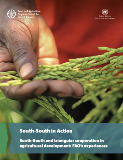FAO and China strengthen cooperation for Latin America and the Caribbean, promoting digitalization in rural areas
The experts of the FAO-China-CELAC cooperation project were received by the Ambassador of the People's Republic of China to Chile, Niu Qingbao.

FAO Senior Policy Officer Luiz Beduschi poses in this photo with the Ambassador of the People's Republic of China to Chile Niu Qingbao and the experts of the FAO-China-CELAC cooperation project.
©FAO Max Valencia
Santiago de Chile, May 31- Within the framework of the Triangular South-South Cooperation, the team of the Regional Office of the Food and Agriculture Organization of the United Nations (FAO), led by the Senior Policy Officer, Luiz Beduschi, and together with the technical experts of the Ministry of Agriculture and Rural Affairs of the People's Republic of China, met with the Ambassador of the People's Republic of China to Chile, Niu Qingbao, to present the project "Response and recovery to the impact of COVID-19 on rural livelihoods and food systems in the countries of the Community of Latin American and Caribbean States (CELAC)”.
FAO welcomes the participants Haibo Zhu, from the Agricultural Information Institute of the Chinese Academy of Agricultural Sciences (CAAS); Guofu Feng, from the Shanghai Ocean University; and Mrs. Zixin Zeng, mission coordinator and official of the Ministry of Agriculture and Rural Affairs of the People's Republic of China.The cooperators will be part of the joint advisory that will be carried out for the CELAC countries.
During the meeting, the axes of action that the cooperation project will have in the region were presented. From the exchange of good practices in public policies; the design of digitalization and electronic commerce strategies for small and medium-sized family farming; the dissemination of territorial pilot solutions; and support for the 1000 Digital Villages initiative.
In addition, FAO representatives stressed that the project will seek to transform rural livelihoods and agri-food systems in 12 countries (Argentina, Barbados, Chile, Costa Rica, Cuba, Guyana, Jamaica, Mexico, Panama, Suriname, Trinidad and Tobago and Uruguay).
“The cooperation project comes at a very interesting time for the region, as there is a growing interest in articulating work between states on rural digitalization issues,” said Senior Policy Officer Luiz Beduschi.
Cooperation Project
The main goal of the project is to promote digitalization in rural areas as a post-COVID-19 recovery measure. Workshops and technical seminars have been held in countries such as Chile, Costa Rica, Uruguay, Cuba, Jamaica and Panama, in order to implement pilot plans and share experiences on digital transformation in cooperatives and rural communities.
On the other hand, it also seeks to promote digitalization and e-commerce strategies in agriculture, providing a public-private roadmap. In this sense, n territorial pilots in Guyana, Mexico, Chile, Costa Rica and Panama to implement digital solutions. The results will strengthen the body of knowledge and good practices on the website of the FAO Regional Technical Platform for Family Farming.

